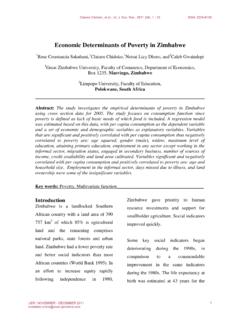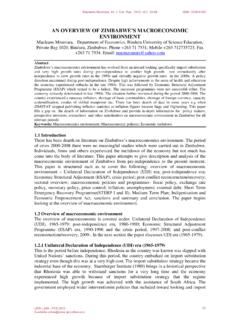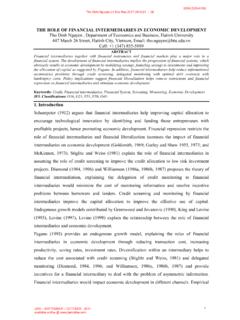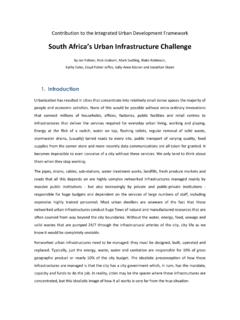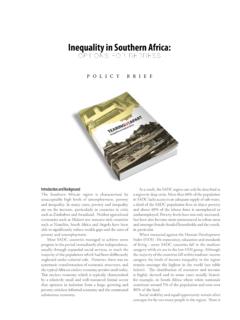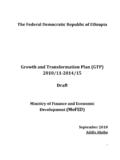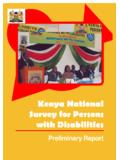Transcription of IMPACT OF THE INFORMAL SECTOR ON THE …
1 IMPACT OF THE INFORMAL SECTOR ON THE current zimbabwean economic environment 1 Clainos Chidoko, 1 Garikai Makuyana, 2 Paul Matungamire and 2 Joseph Bemani 1 Department of Economics, 2 Department of Accounting and Information Systems Great Zimbabwe University, Faculty of Commerce, Box 1235,Masvingo, Zimbabwe Abstract: The paper sought to investigate the economic IMPACT of the INFORMAL SECTOR in the zimbabwean economy. It was discovered that the INFORMAL SECTOR is very significant in its contribution to the development of the zimbabwean economy. However the small entrepreneurs find difficulties in their operations because of the lack of capital and collateral. Given their significance in the economy, the paper suggests that these businesses should be assisted by the relevant stakeholders to graduate from INFORMAL to formal SECTOR .
2 This will enhance rapid economic growth. Key words: INFORMAL SECTOR , Collateral security, Capital, Production, economic Challenges. Introduction According to Marjo-Riitta Liimatainen (2002) cited in Cross (2004:1) the term INFORMAL SECTOR was used for the first time in the reports on Ghana and Kenya prepared under the ILO World Employment Programme at the beginning of the 1970s. The term is commonly used to refer to that segment of labour market in the developing countries that has absorbed significant numbers of jobseekers, mostly in self-employment, and to workers in very small production units (ILO, 2000). INFORMAL activities are often characterized by low levels of capital, skills, access to organized markets and technology; low and unstable incomes and poor and unpredictable working conditions.
3 INFORMAL activities are often outside the scope of official statistical enumeration and government regulations, and beyond formal systems of labour and social protection (ILO, 2000:20). Some studies suggest that the smallest enterprises are most likely to be INFORMAL (ILO, 1999:36). Cross (1998:5) asserts that the INFORMAL SECTOR describes economic activity that takes place outside the formal norms of economic transactions established by the state and formal business practices but which is not clearly illegal in itself. Generally, the term applies to small or micro-businesses that are the result of individual or family self-employment. Some definition may include a SECTOR which encompasses all jobs which are not recognized as normal income sources, and on which taxes are not paid.
4 The term is sometimes used to refer to illegal activities. However, the INFORMAL SECTOR could also be interpreted to include legal activities, such as jobs that are performed in exchange for something other than money. There is widespread agreement that the SECTOR represents a growing proportion of economic activity, particularly in developing countries (Cross 1998:6). Cross (1998:7) has placed it at the centre of debate about its importance with respect to economic development. The INFORMAL SECTOR is efficient at generating job opportunities at a very low cost for some segments of the population. In many developing nations, self-employment and small enterprises in the INFORMAL SECTOR in the late 1980s absorbed some workers who had lost their jobs in the formal economy.
5 Jobs in Zimbabwe's formal SECTOR are showing negative growth, while some jobs Clainos Chidoko, , Int. J. Eco. Res., 2011 2(6), 26 - 28 ISSN: 2229-6158 IJER | NOVEMBER - DECEMBER 2011 Available the INFORMAL SECTOR are showing positive growth. Players in the INFORMAL SECTOR in Zimbabwe There are no definite figures on the INFORMAL SECTOR . However intensive manufacturing also takes place under this SECTOR . Major players include flea markets operators, furniture manufacturers, suppliers and producers of agricultural products, food vendors etc. Whatever economic activity taking place in the formal SECTOR , it has its counterpart in the INFORMAL SECTOR . Where do we get these INFORMAL entrepreneurs?
6 They are located in both rural and urban centres, including growth points. IMPACT of the INFORMAL SECTOR There is widespread agreement that the SECTOR impacts positively on the economy through various avenues. Contribution to Gross Domestic Product: More goods are availed to the market through increased production leading to the INFORMAL SECTOR contributing significantly to gross domestic product. Employment Creation: With the high unemployment in Zimbabwe, job creation, particularly that focusing on the smaller enterprises in the INFORMAL economy, is important. Zimbabwe s fast growing INFORMAL SECTOR is now the country s largest employer as the economy is failing to absorb many job seekers into formal employment.
7 For the past decade, over two million people have been making their living in the INFORMAL SECTOR . Hundreds of job seekers come out of Zimbabwe s school system each year with little chance of finding work in the formal SECTOR . The government is also doing its part by catering for this SECTOR through the activities of the Ministry of Small and Medium Enterprises and organs such as Small Enterprises Development Corporation (SEDCO). The existence of the ministry is a demonstration of the importance of the INFORMAL SECTOR in contributing to economic growth. Increase in investment: Through increased income as a result of engaging in economic activities, the entrepreneurs will be able to accumulate savings and hence continuing investing and reinvesting in the SECTOR .
8 Other positive contributions: These include reduction of crime levels, reduction of rural to urban migration and r eduction of poverty levels. There is also importation of essential goods/equipment required in the formal SECTOR and provision of goods at lower cost because of lower overheads. INFORMAL SECTOR can also act as a base for apprenticeship training. Challenges Lack of capital and collateral: While the government and other stakeholders in the economy have begun to realize the SECTOR s importance, there is still little assistance for many small businesses and some are operating at below capacity. Many entrepreneurs in the INFORMAL SECTOR have no access to banking facilities at all.
9 Most have no collateral to secure loans from banks. Lack of necessary skills accounting and managerial:. Most INFORMAL business operators lack the necessary skills in operating their businesses. They at times do not keep proper records. They at times rely on their memory for purposes of business records. Relying on memory as an alternative to written records has the biggest drawback of forgetting. Chidoko C, Mutembwa B and Bemani J (2011:43) Limited Life span: Most INFORMAL businesses have short life span, that does not go beyond the life span of the owner. The business can only thrive as long as the owner still has the will to remain in the business.
10 Clainos Chidoko, , Int. J. Eco. Res., 2011 2(6), 26 - 28 ISSN: 2229-6158 IJER | NOVEMBER - DECEMBER 2011 Available requirements: In Zimbabwe the bureaucratic registration procedures drive many businesses into the INFORMAL SECTOR . The INFORMAL SECTOR comprises unregistered businesses. Labour: Labour is usually family based. They operate with a low level of organization, with little division between labour and capital, as factors of production. Equipment: This is a challenge for the INFORMAL SECTOR players. They usually do not have enough and appropriate equipment to execute their duties. Way forward and Conclusion The INFORMAL SECTOR should graduate to formal SECTOR .

